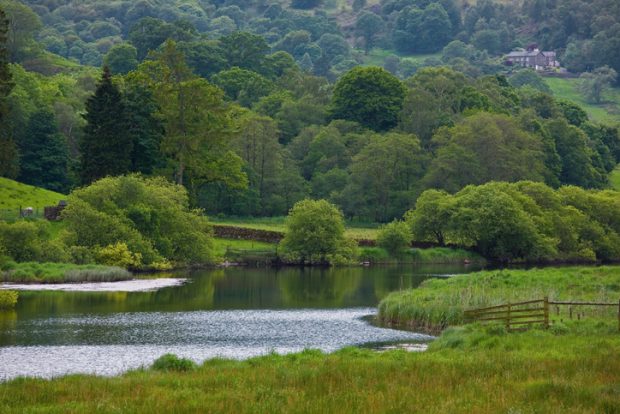
There has been inaccurate coverage in the i this weekend following the launch of their Save Britain’s Rivers campaign.
The headline claim on Saturday that only 6% of Britain’s rivers are on course to be healthy by 2027 is completely untrue.
This figure relates to Environment Agency modelling showing what would happen in England, by 2043, if no action was taken.
That is why a huge amount of action is already underway, including new legally binding targets, our Storm Overflows Discharge Reduction Plan and plans to make it easier for regulators to enforce penalties and hold water companies to account.
We use many biological and habitat measures to check the health of our waters – and currently almost 80% of individual tests meet the threshold for good ecological status. However, only 16% are classed as ‘good’ overall. This is due to the “one-out-all-out” principle – failure of any one individual test means that overall the water body will fail.
A Defra spokesperson said:
"We are committed to restoring our rivers and we will continue to crack down and take the strongest possible action against polluters.
“It’s completely untrue that only 6% of England’s rivers are on course to be healthy by 2027. This figure is what would happen by 2043 if we were not taking the huge amount of action which is already underway.
“We have put the strictest targets ever on water companies to clean up our water, delivering the largest infrastructure programme in their history to tackle sewage spills. Since 2015, we have also seen the number of bathing waters classified as ‘good’ or ‘excellent’ increase to 92.8%, and record levels of fines for water companies who break the law.”
Environment Agency enforcement
The article also claims that regulators do not have the legal powers to hold water companies to account. Again, this is not true. Where water companies are found to be breaking the law, they will face enforcement action.
Since 2015, the Environment Agency has brought 56 prosecutions against water companies, securing fines of over £142 million. It is also undertaking a major investigation into potential widespread non-compliance by water and sewerage companies at more than 2200 sewage treatment works, involving all the water companies.
Retained EU Law
Further coverage from the i today also claims that the Government plans to weaken regulations that protect our waters under the new Retained EU Law Bill. This is not the case.
A Government spokesperson said:
“This Government has no plans to weaken any regulations that protect our waters. In recent years we have strengthened them – including major new duties on water companies to tackle storm overflows.
“As we have made clear, reviewing our retained EU law will not come at the expense of the UK’s already high standards and environmental protections will not be downgraded.”
5 comments
Comment by Matt Wheeldon posted on
Actually the better way (for the planet and customers) to address storm overflows is to not let the rainwater mix with sewage in the first place.
The good rainwater management principles are 1. Treat rain as a resource to be stored locally and reused where possible 2. Enable the surplus to be returned to the environment as close to where it landed as possible without mixing it with sewage. Simples.
Storing it, pumping it, treating it has a massive carbon footprint compared to separation at source.
Separation at source requires societal intervention (at property level) for rainwater rather than trying to fix it when its too late (when its combined with sewage).
Comment by Mike Mellor posted on
I’m really pleased to see the rapid response you make to media articles. As well as setting out the government’s explanations you are also highlighting the extent of media coverage on particular topics. Thank you.
Comment by John W. Baxter posted on
The way to tackle STORM overflow usage is to increase treating capacity and pumping capacity from pump wells as the water companies and OFWAT and the EA have known for years . When storm flows were active in the summer of 2022 they indicated the dismal state of affairs of our waste water treatment facilities in the U.K. …… very third world!.
The time has come, long overdue , for action in the improvement of water quality in our water courses, without casting an eye to agriculture at a time when water companies have profitably exploited feeble government .
Comment by William Hughes-Games posted on
You have done the basic experiment and seen the results. Beavers in the catchment really do improve every aspect of the health of a river. This is apparent even though the extent of beaver introduction is still way below the ideal level. Now we have, all over the world, including in the UK, a situation in which rainfall events are more extreme, interspersed by longer drought periods. Beavers greatly help with this problem. Time to go all the way and get beavers into every possible location where they can survive.
Comment by Michael Heylin OBE posted on
If this was all true the rivers would be in much better condition than they are. Spinning nothing but a headline is like fishing without any bait.
Retained EU Law Bill will remove the Water Framework Directive and government proposals to replace it are yet to be published. Meaningless words in various publications and press releases do not make policy or legislation and they certainly do not protect our rivers.
Since 2015 how many prosecutions has the EA failed to bring forward? More than it has actually taken. And the fines go to the exchequer not to the damaged environment and not even to the EA. Sorry this is just an embarrassment for any half decent PR, you can tell it's only a story because the "government spokesman" has no name and therefor no responsibility for the statement.